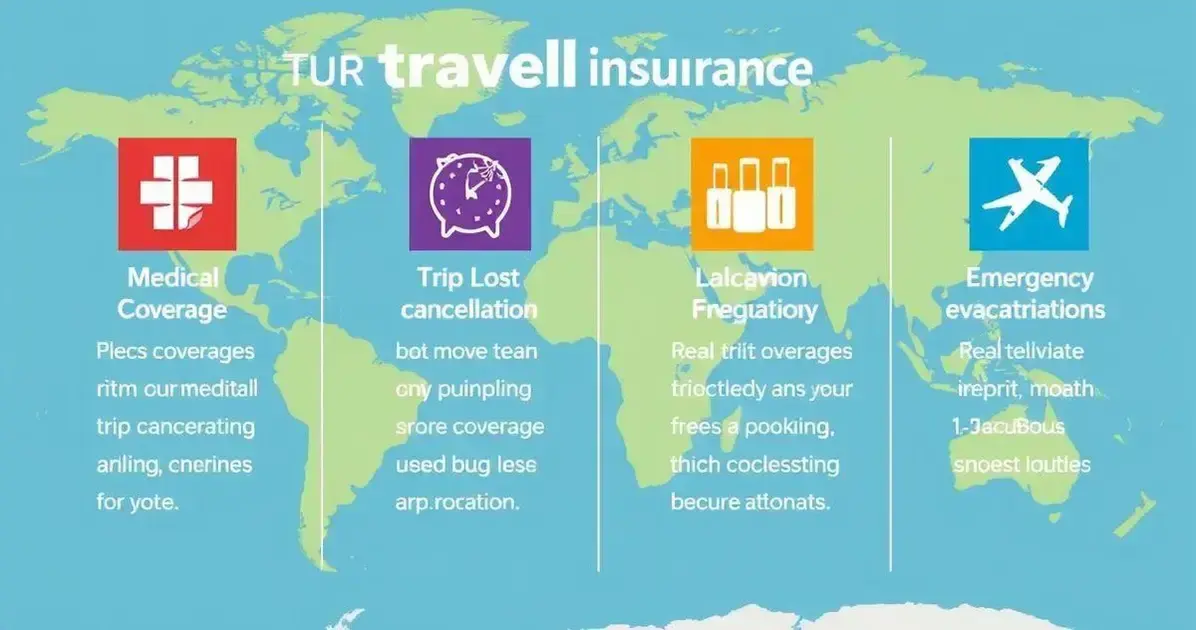Índice
Travel insurance is an essential part of planning any trip. It offers protection against unexpected events like medical emergencies, trip cancellations, and lost or stolen belongings, giving you peace of mind while traveling.
Understanding the different types of travel insurance and the specific benefits each plan offers can help you choose the right coverage. It’s important to know what is included, what is excluded, and how to make the most of your policy if needed.
Learning tips for filing claims and maximizing your coverage can make a huge difference during unexpected situations. Keep reading to find out how travel insurance can turn challenges into minor bumps along your journey, ensuring a safer and more enjoyable trip.
What is Travel Insurance?
Travel insurance is a type of insurance designed to protect you from various risks associated with travelling. It provides coverage for unexpected events that may occur before or during your trip, including medical emergencies, trip cancellations, lost luggage, and travel delays. By purchasing travel insurance, you ensure that you are financially protected in situations that may otherwise lead to significant expenses.
Why Do You Need Travel Insurance?
When you travel, especially internationally, unexpected incidents can happen. Imagine getting sick or injured while abroad, cancelling your trip due to unforeseen circumstances, or losing your belongings. Travel insurance can help cover these costs, so you don’t have to worry about financial burdens while enjoying your adventure.
Who Should Get Travel Insurance?
Anyone planning a trip can benefit from travel insurance. Whether you’re a frequent traveller or going on a once-in-a-lifetime journey, this insurance can provide peace of mind. It is particularly important for international travel, where medical costs and other expenses can be much higher.
What Does Travel Insurance Cover?
Typical coverage areas include medical expenses for illness or injury, trip cancellation or interruption, travel delays, lost or stolen luggage, and emergency evacuations. However, coverage can vary between policies, so it is important to read the fine print and understand what is included.
Types of Travel Insurance
Types of travel insurance can vary significantly, depending on your needs and the nature of your travel. Understanding these types can help you choose the right coverage and ensure your adventures are protected.
1. Single-trip Travel Insurance
This type of policy covers you for one specific trip. It is ideal for those who are only travelling occasionally. When you purchase this insurance, it will cover your journey from the time you leave until you return home.
2. Annual Multi-trip Travel Insurance
If you travel frequently throughout the year, an annual multi-trip policy might be the best choice. This insurance covers you for multiple trips within a 12-month period. It offers convenience and can often be more cost-effective than buying single-trip coverage each time.
3. Comprehensive Travel Insurance
Comprehensive insurance offers a wide range of coverage, including medical expenses, trip cancellations, lost luggage, and more. It is ideal for travellers who want maximum protection during their trips.
4. Medical Travel Insurance
This type of policy is specifically designed to cover medical expenses incurred while abroad. It is essential for those travelling to countries where healthcare costs are high or for those with pre-existing medical conditions.
5. Adventure Travel Insurance
For those participating in extreme sports or adventurous activities, adventure travel insurance provides additional coverage. It often includes activities like skiing, scuba diving, or climbing, which may not be covered under standard policies.
6. Group Travel Insurance
If you are travelling with a group, such as family or friends, group travel insurance can cover multiple people under one policy. This can simplify the process and may offer better rates than individual policies.
Benefits of Having Travel Insurance

Having travel insurance offers numerous benefits that can enhance your travel experience and provide peace of mind. Knowing that you are covered means you can focus on enjoying your journey.
1. Medical Coverage
One of the main advantages of travel insurance is medical coverage. If you become ill or injured while travelling, this insurance can help pay for medical expenses, which can be very high in some countries. This includes hospital stays, doctor visits, and emergency treatments.
2. Trip Cancellation Protection
Travel insurance typically covers trip cancellations, which can save you money. If you need to cancel your trip due to unforeseen circumstances, such as illness or family emergencies, having insurance means you can recover some of the money spent on flights and accommodations.
3. Protection Against Lost Luggage
Another significant benefit is protection against lost, stolen, or damaged luggage. If your bags go missing or your belongings are damaged, travel insurance can help compensate you for those losses, providing coverage for essential items you may need to purchase in the meantime.
4. Travel Delays and Interruptions
Delays can happen for various reasons, including weather conditions or mechanical issues. Travel insurance can reimburse you for additional expenses incurred due to these delays, such as hotel accommodations, meals, and transportation.
5. Emergency Evacuations
In extreme cases, such as natural disasters or civil unrest, travel insurance can cover the costs of emergency evacuations. This ensures your safety and helps you return home if necessary.
6. Peace of Mind
Ultimately, the biggest benefit of having travel insurance is peace of mind. Knowing that you are protected against various potential risks allows you to relax and enjoy your travel experience without constant worry about what might go wrong.
How to Choose the Right Travel Insurance
Choosing the right travel insurance can be overwhelming due to the various options available. However, by following some simple steps, you can ensure that you find the most suitable coverage for your needs.
1. Assess Your Travel Needs
Before selecting a policy, consider the specifics of your trip. Are you travelling internationally or domestically? Will you be engaging in adventure sports or need coverage for any pre-existing medical conditions? Understanding your travel needs will help narrow down your options.
2. Compare Policies
Once you know your requirements, it is essential to compare different travel insurance policies. Look at the coverage each policy offers, including medical expenses, trip cancellations, and baggage loss. Comparing policies side-by-side can help you find the best coverage for your budget.
3. Read the Fine Print
Each travel insurance policy will have exclusions and limitations. It’s crucial to read the fine print and understand what is and isn’t covered. Pay attention to details regarding trip cancellations, medical coverage, and any activities that may not be covered.
4. Check Customer Reviews
Customer reviews can provide valuable insights into the reliability of an insurance provider. Look for reviews that discuss the claims process, customer service experiences, and how easy it was to get help when needed.
5. Evaluate the Claims Process
Find out how to file a claim before purchasing the policy. A straightforward and efficient claims process can save you time and stress if you need to use your insurance while travelling. Make sure to ask about documentation required to file a claim.
6. Consider the Cost
While cost is an important factor, it should not be the only consideration. The cheapest policy may not provide adequate coverage. Strike a balance between affordability and comprehensive coverage to ensure you are fully protected during your travels.
Common Misconceptions about Travel Insurance
Common misconceptions about travel insurance can lead to confusion and discourage travellers from purchasing the coverage they need. Here are some of the most prevalent myths debunked.
1. Travel Insurance is Only for International Travel
Many people believe that travel insurance is only necessary for trips abroad. However, even domestic trips can encounter risks, such as cancellations and medical emergencies, making travel insurance essential regardless of your destination.
2. I’m Already Covered by My Health Insurance
Some travellers think their regular health insurance will cover them while travelling. Unfortunately, this is often not the case, especially if you are travelling internationally. It’s crucial to review your health insurance policy and consider additional travel insurance to ensure proper coverage.
3. Travel Insurance is Too Expensive
Many believe that travel insurance is not worth the cost. However, when you consider the potential financial losses from unexpected events, the price of insurance can be minimal in comparison. Various options are available to suit different budgets.
4. All Travel Insurance Policies are the Same
Not all travel insurance policies offer the same level of coverage. Policies can vary greatly in what they cover and what exclusions apply. Always read the details and choose a policy that fits your travel needs.
5. I Don’t Need Insurance If I’m Healthy
Being healthy does not eliminate all travel risks. Accidents and unforeseen events can happen to anyone, regardless of health status. Thus, having travel insurance is a wise safeguard against unexpected situations.
6. Travel Insurance Covers Everything
While travel insurance covers many risks, it does not cover everything. There may be specific exclusions related to activities or pre-existing conditions. It’s crucial to understand what is included and what is not before relying on your policy.
Tips for Filing a Travel Insurance Claim

Filing a travel insurance claim can sometimes feel daunting, but following these tips can make the process smoother and increase your chances of a successful claim.
1. Report Incidents Immediately
As soon as an incident occurs, such as a medical emergency or lost luggage, report it immediately. Prompt reporting helps create a record that supports your claim and shows it was addressed in a timely manner.
2. Gather Documentation
Collect all necessary documents related to your claim. This includes receipts for expenses, police reports for theft, medical records, and any other relevant paperwork. Having thorough documentation is crucial for substantiating your claim.
3. Understand Your Policy
Review your travel insurance policy carefully to understand the coverage provided. Familiarise yourself with what is covered, any exclusions, and the required steps to file a claim. This knowledge will streamline the process.
4. Use the Insurance Company’s Forms
Always use the claim forms provided by your insurance company. This ensures that you include all the necessary information and helps prevent delays in processing your claim. Complete the forms accurately and provide all requested details.
5. Keep Copies of Everything
Maintain copies of all documents you submit, as well as correspondence with the insurance company. This can be helpful if you need to follow up or if there are any disputes regarding your claim.
6. Follow Up Regularly
If you haven’t received an update on your claim after a reasonable period, contact your insurance provider for a status update. Regular follow-ups can keep your claim moving through the process and address any issues promptly.
7. Be Patient but Persistent
The claims process can take time, so be patient. However, if you feel that your claim is taking too long or you encounter difficulties, don’t hesitate to be persistent. Advocate for yourself and ensure that your claim is addressed.
Check out our article on Ticket Travel to discover tips for finding the best deals on travel tickets and making your journey more affordable.
